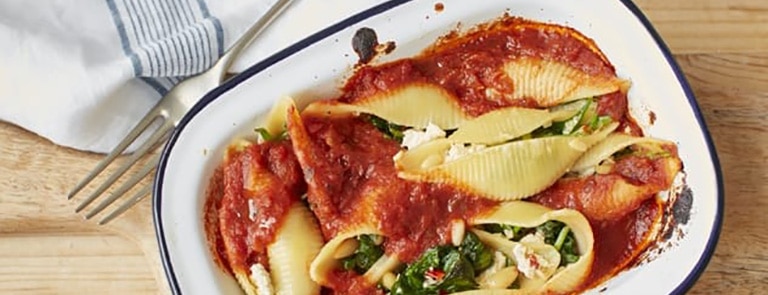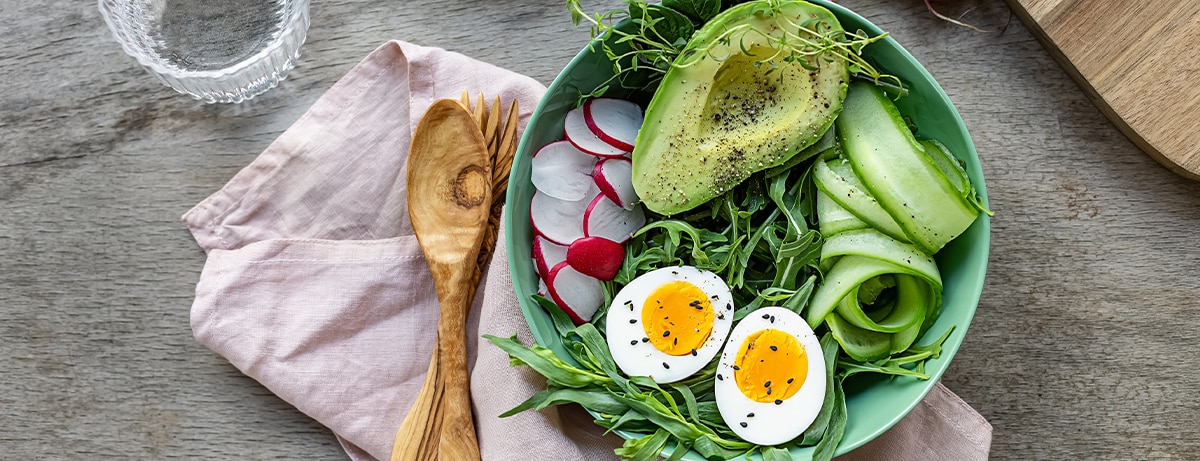10% off £35
5 low carb diets
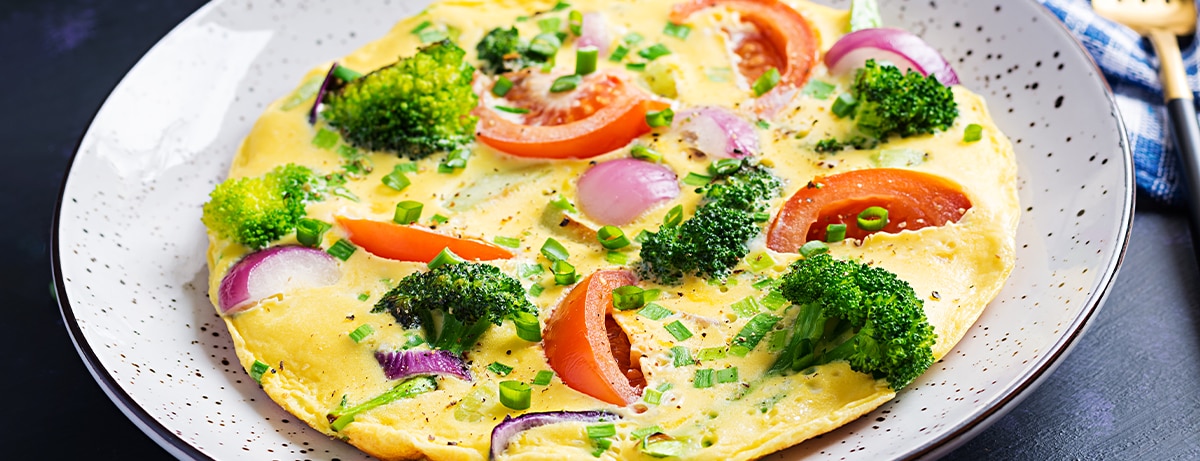
Low carb diets have risen in popularity over the years, and as the name suggests, aim to reduce the amount of carbohydrates you eat throughout the day. Instead, they encourage you to choose healthy fats, proteins, and non-starchy vegetables.1
There are many different low carb diets out there, but what actually are they, and are they good for you? Here, we’ll give you the lowdown on 5 low-carb diets including the keto diet, Atkins and the carb-free diet, as well as the potential risks of cutting out carbs.
What are carbs?
Carbohydrates – or carbs – are a type of macronutrient, found in many different types of food. They're found in sugars, starch, and fibres, and foods like potatoes, bread and pasta being rich sources or starchy carbs.3
The healthiest carbs are those that are unprocessed. This includes grains, fruits, and vegetables and these all provide the essential vitamins, minerals and nutrients that you need for a balanced diet.4
Why do we need carbohydrates?
Why do we need carbohydrates?
Carbohydrates are an important food group. They're a source of energy and can be broken down into glucose to fuel the body for activities.5
However, like all food groups, it's vital to eat them in moderation. Eating too many processed carbohydrates can result in you becoming overweight, increasing the risk of developing type 2 diabetes and high blood pressure. It can also make you feel tired and lead to a poorly functioning digestive system.6
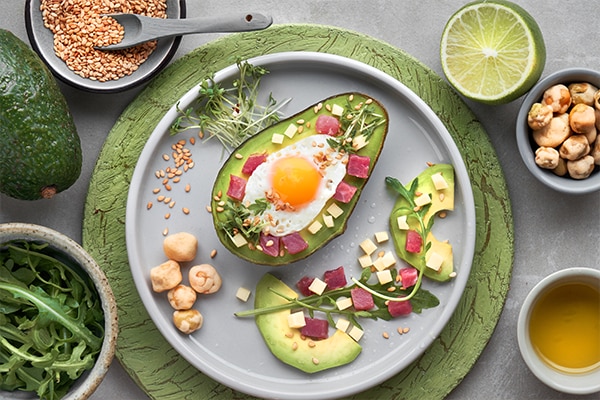

Low carb diets limit the amount of carbohydrates you eat and focus on increasing your protein and healthy fat intake.7
In some cases, people choose to follow a low carb diet to help them lose weight, but others may just want to change their eating habits or simply enjoy the types of food that a low carb diet recommends. While each diet varies, they have been linked to possible health benefits like supporting weight loss and helping to manage blood sugar levels.8,9
However, it's important to speak to your GP before you start any diet, particularly if you're taking any medication or have any existing conditions.
Following a low-carb diet doesn’t have to be complicated as there are plenty of low-carb foods to choose from that are also healthy.
Here are low carb foods that can be nutritious and healthy:
- Lean meat: certain cuts of beef, lamb, chicken, pork and are low in carbs, but it's always worth checking the packaging.10,11,12,13
- Eggs: packed full of so many vitamins and minerals, eggs are low in carbs too.14
- Fish and seafood: fish like salmon, and seafood like prawns, are high in so many essential nutrients but are low carb as well.15,16
- Vegetables: most vegetables are naturally low in carbs, especially leafy greens like kale and cruciferous vegetables like broccoli – and they’re full of fibre too.17,18
- Fruits: some fruits are actually high in carbs, especially when compared to vegetables, but fruits like avocadoes, strawberries and grapefruits are all thought to be lower in carbohydrates.19,20,21
- Nuts and seeds: low in carbs but high in fibre, protein and other nutrients, nuts like almonds and seeds like chia seeds make great low carb snacks.22,23
5 low carb diets
There are many kinds of low-carb diets out there, with each one varying as to the type and amount of carbs you eat. Here are 5 low-carb diets you could try:
1. The Atkins Diet
1. The Atkins Diet
An American physician, Robert Atkins, devised this low carbohydrate diet that is thought to help the body burn fat while reducing the amount of carbs consumed.24
The first phase of the Atkins diet involves eating more protein with low-carb vegetables. The following phases from two to four, help to ease the speed of the rapid weight loss, through slowly adding low-carb foods, until the body can maintain a healthy weight.25
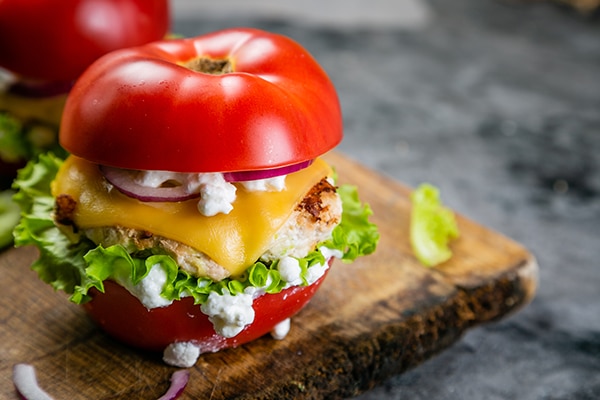

2. Dukan Diet
2. Dukan Diet
Another low-carb diet plan is the Dukan diet by nutritionist, Dr. Pierre Dukan. The Dukan diet involves high-protein and low-carb consumption.26 Like the Atkins diet, this low-carb plan has four phases to gradually reduce and maintain carb intake.
Phase one includes a strict protein diet, which is based on a list of 72 low-fat, protein-rich foods such as chicken, turkey, eggs, and fish, but no carbs or vegetables are allowed for the first phase. Fruit, vegetables, and carbs are to be incorporated back into the diet for phases two to four.27
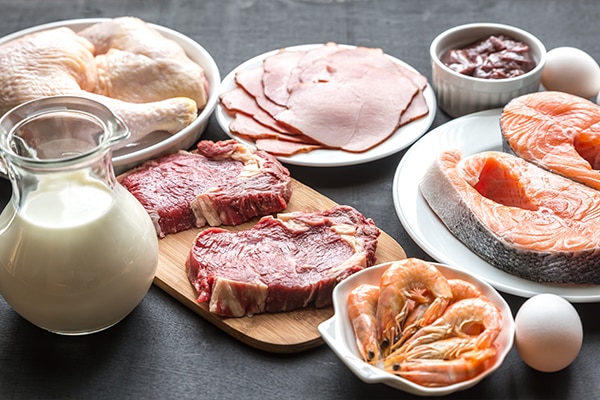

The South Beach Diet is a low-glycaemic index (GI) diet. GI is a ranking of carbohydrates on how they affect blood glucose levels.28 Foods such as green vegetables, mushrooms, tomatoes, garlic, and chickpeas have a low GI, which means that they are easily digested.29
This diet has no limits on portions or requirements to count calories. Those willing to follow the plan must follow an exercise regime too.28 Much like the Dukan Diet, phase one involves eating lean protein such as fish and beans, while phases two and three involve eating low GI carbs for gradual and sustainable weight loss.28
4. Ketogenic
4. Ketogenic
More commonly known as the ‘keto’ diet, this plan involves high-fat, low-carb foods. This reduction in carbohydrates puts the body into a metabolic state called ketosis, which means the body is using fat to create energy.30
The keto diet involves restricting or cutting out high-carb foods almost completely. Meat, fatty fish, eggs, butter, cream, cheese, nuts and seeds, healthy oils such as olive and avocado, and low-carb vegetables such as tomatoes, onions and peppers are good for this diet.31
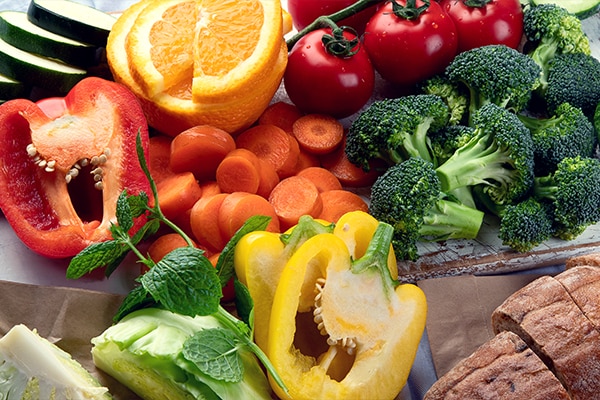

There is also the option of a zero-carb diet but as carbohydrates provide your body with energy, a person on a no-carb diet must consume enough protein or fat, such as meat, fish, and eggs, to have an alternative energy source.32
Like the Keto diet, this plan encourages you to eliminate almost all carbs from entering the body, while allowing you to gain calories from proteins and fats.32
As with any diet, especially one that eliminates a food group, there can be some side effects of following a low-carb diet.
Many people have found that suddenly cutting out carbs caused them to have rapid weight loss, headaches, muscle cramps and even constipation, and the longer-term effects are not completely clear.33 It’s thought that limiting carbs for a long period of time might lead to vitamin and mineral deficiencies and further digestive issues, which could cause negative effects in turn.33
When cutting out carbs and increasing your intake of fats and protein, make sure you choose healthy fats and lean protein where possible. Try to keep your intake of saturated and trans-fat products down, as these have been linked to heart disease.34
If you're considering trying out any of these diets, it's always advisable to first contact a GP, nutritionist, or dietician, to ensure that this is the right diet for you.
There are several low carb diets available to experiment with, each with different approaches. Generally, these diets limit your daily carbohydrate intake while encouraging more protein and fat-rich foods.
It's important to note that while a low carb diet may be helpful for weight loss or blood sugar stabilization, you should be cautious when following it. Like any diet, it's always a good idea to check with your doctor before you start to make sure it's safe for you.
1. https://www.aafp.org/pubs/afp/issues/2006/0601/p1942.html
2. https://www.hsph.harvard.edu/nutritionsource/carbohydrates/
3. https://www.nhs.uk/live-well/eat-well/food-types/starchy-foods-and-carbohydrates/
4. https://www.helpguide.org/articles/healthy-eating/choosing-healthy-carbs.htm
6. https://www.hriuk.org/health/nutrition/all-about-carbs
7. https://europepmc.org/article/NBK/nbk537084
8. https://jamanetwork.com/journals/jama/article-abstract/2722768
9. https://www.ingentaconnect.com/content/wk/coedo/2021/00000028/00000005/art00009
10. https://fdc.nal.usda.gov/fdc-app.html#/food-details/174030/nutrients
11. https://fdc.nal.usda.gov/fdc-app.html#/food-details/174370/nutrients
12. https://fdc.nal.usda.gov/fdc-app.html#/food-details/331960/nutrients
13. https://fdc.nal.usda.gov/fdc-app.html#/food-details/167902/nutrients
14. https://fdc.nal.usda.gov/fdc-app.html#/food-details/748967/nutrients
15. https://fdc.nal.usda.gov/fdc-app.html#/food-details/175167/nutrients
16. https://fdc.nal.usda.gov/fdc-app.html#/food-details/175179/nutrients
17. https://fdc.nal.usda.gov/fdc-app.html#/food-details/168421/nutrients
18. https://fdc.nal.usda.gov/fdc-app.html#/food-details/170379/nutrients
19. https://fdc.nal.usda.gov/fdc-app.html#/food-details/171706/nutrients
20. https://fdc.nal.usda.gov/fdc-app.html#/food-details/1102710/nutrients
21. https://fdc.nal.usda.gov/fdc-app.html#/food-details/1102591/nutrients
22. https://fdc.nal.usda.gov/fdc-app.html#/food-details/1100508/nutrients
23. https://fdc.nal.usda.gov/fdc-app.html#/food-details/170554/nutrients
24. https://www.atkins.com/low-carb-diet
25. https://health.usnews.com/best-diet/atkins-diet
26. https://www.dukandiet.co.uk/the-dukan-diet/method/the-original-diet?eprivacy=1
27. https://www.dukandiet.co.uk/the-dukan-diet/4-phases
28. https://health.usnews.com/best-diet/south-beach-diet
29. https://www.nhs.uk/common-health-questions/food-and-diet/what-is-the-glycaemic-index-gi/
30. https://pubmed.ncbi.nlm.nih.gov/14525681/
31. https://www.health.harvard.edu/staying-healthy/should-you-try-the-keto-diet
32. https://www.mdpi.com/2076-328X/11/12/161
33. https://www.gbhealthwatch.com/Nutrient-Carbohydrate-Symptoms.php
